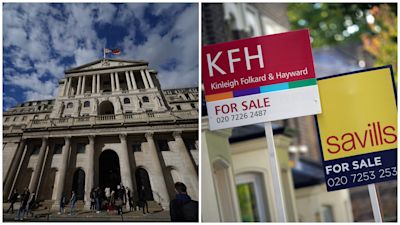Insight
Banks urged to revive mortgage holidays as rising interest rates hit the housing market

As housing is becoming more and more unaffordable, ITV News Economics Editor Joel Hills explains.
The economy is probably already in recession and interest rates have risen sharply, so it’s hardly a surprise that house prices fell last month.
But the scale of drop reported by Nationwide (1.4% in November) was greater than expected.
Conventional wisdom holds that the substantial savings many households accumulated during lockdowns and a reduced supply of properties for sale will help to prop-up the market in a downturn.
That theory is starting to look shaky.
In the months ahead, many homeowners will be in the very uncomfortable position of seeing their biggest asset fall in value while their mortgage repaynts rise.
The UK has already been hit by the energy price shock and the food price shock.
The full force of an interest rate shock is starting to be felt.
The Bank of England has increased Bank Rate from 0.1% last December to 3% today, in an effort to bring double digit inflation back down to target.
Investors think interest rates will peak at 4.5% next summer. If they are right then the National Institute of Economic and Social Research (NIESR) calculates that 3.8 million households will see their monthly mortgage repayments rise by an average of £400.
NIESR estimates that a jump in borrowing costs on that scale would wipe out the savings of 1.4 million households by the end of next year.
'We don’t have to throw people into destitution': National Institute of Economic and Social Research director Jagjit Chadha tells ITV News
“We think a significant number of households will have trouble in the next year and a half meeting their bills,” says Jagjit Chadha, director of the NIESR.
He wants banks and building societies to revive the mortgage holidays they offered customers in the early stages of the pandemic and argues it’s in their interests to do so.
“The risk of doing nothing is a much deeper contraction than we would ideally want,” Chadha says.
“Yes, interest rates have to go up... but we don't have to have mass repossessions, we don’t have to have widespread unemployment, we don’t have to throw people into destitution. That’s where these sort of interventions can help. They can reduce the size of the impact of shocks on the economy and on households”.
Repayment holidays during Covid allowed homeowners to temporarily stop or reduce their monthly mortgage repayments.
The scheme ran between March 2020 and July 2021 and 2.9 million deferred repayments by up to six months.
As it stands, lenders have no plans to revive the scheme.
Under existing rules banks and building societies must treat customers who fall into arrears fairly and repossessions are much rarer than they were.
However, NIESR’s analysis suggests the impact of higher interest rates will leave some people struggling hold onto their homes even if they manage to stay in work in the months ahead.
Want a quick and expert briefing on the biggest news stories? Listen to our latest podcasts to find out What You Need To Know.